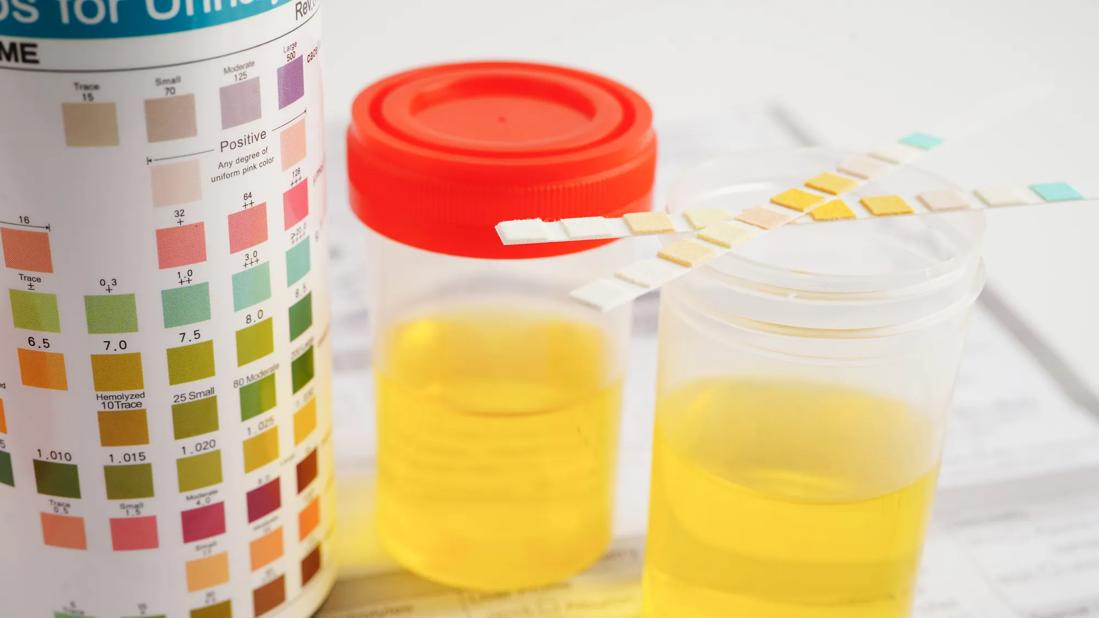At-home tests measure FSH levels in urine, but they can’t actually diagnose menopause

Image content: This image is available to view online.
View image online (https://assets.clevelandclinic.org/transform/dd28eb8f-bfca-45d2-8976-1e2ce6e52d67/urine-test-1874594447)
An FSH at home urine test kit
When you were younger, you may have gone to your local drugstore to pick up a pregnancy test to see if you were expecting. Now that you’re, shall we say … a wee bit older, you can pee on a different stick at home to see if you’re in menopause.
Advertisement
Cleveland Clinic is a non-profit academic medical center. Advertising on our site helps support our mission. We do not endorse non-Cleveland Clinic products or services. Policy
But is an at-home menopause test worth the money? Probably not, says Sobia Khan, MD, a women’s health specialist.
“These tests may be convenient and easy to use, but the results can’t reliably tell you if you’re in menopause,” she states.
Here’s what Dr. Khan wants you to know about at-home menopause tests.
Home menopause tests measure changing levels of follicle-stimulating hormone (FSH) in your urine across several days. Most kits take the average of several FSH readings. They combine that result with other factors like your age and menstruation history to provide a probable stage of menopause.
FSH levels are measured in milli-international units per milliliter (mIU/mL). In general, FSH levels are between:
Your pituitary gland makes FSH. This hormone increases during your menstrual cycle, causing your ovaries to make more estrogen. When you’re having periods, FSH and estrogen stimulate small sacs in your ovaries (called follicles) to release eggs.
The amount of ovarian follicles you have decreases with age, which is why estrogen levels drop during menopause. But your pituitary gland didn’t get the memo about what’s going on. It makes more FSH in an attempt to get your body to make more estrogen. The result: FSH levels rise during menopause.
Advertisement
These changing hormone levels cause you to have irregular periods during perimenopause (the first stage of menopause). You may have spotting, heavy bleeding or skip a period.
Perimenopause can start as early as your 30s but typically begins in your mid-40s. This premenopause stage may last up to seven years before your periods stop altogether.
You’re in menopause when you’ve gone 12 consecutive months without a period. Most people enter menopause in their early 50s. After that, you’re postmenopausal for the rest of your life.
It depends on what you mean by accurate. The tests are 90% accurate at detecting elevated FSH levels. But that information isn’t necessarily useful, says Dr. Khan.
“Hormone levels can change by the minute,” she explains. “A higher-than-usual test result doesn’t always mean you’re in perimenopause or menopause. It means your FSH levels were elevated when you took the test.”
Providers prefer to use blood tests to measure FSH and estrogen levels, but Dr. Khan says even those results aren’t necessary or helpful.
“There isn’t a definitive diagnostic test for menopause,” she states. “Providers make a diagnosis based on your symptoms and menstrual cycle history. We don’t rely on blood or urine tests.”
Regardless of your age, she recommends seeing your healthcare provider if you have one or more of these menopause symptoms:
If a physical exam and symptom assessment indicate perimenopause or menopause, it’s time to discuss options for managing symptoms.
“Hormone replacement therapy can be very helpful,” says Dr. Khan. “And we now know that the cancer risks from HRT are very low for most people.”
If you still want to test your FSH levels at home, you can buy menopause tests online or at your local drugstore. The tests typically cost $20 to $30. You may be able to purchase a test kit with funds from a health savings account (HSA). Or check with your health insurer to see if they’ll reimburse you.
Test directions can vary depending on the kit. For the most accurate results, carefully read through each step of the instructions before you test.
Because FSH levels can change every day, most tests use data from multiple urine samples you collect over several days. Manufacturers usually recommend testing the first pee after you wake up.
There are some benefits to taking menopause tests at home. A positive result may confirm that new or unusual physical and emotional changes may be due to menopause. Plus, the test may prompt a visit to your healthcare provider for next steps.
Advertisement
Still, Dr. Khan says seeing your provider should be the priority.
“If a home menopause test is positive, see your provider for an evaluation and to discuss treatments,” she advises.
But also see your provider if the test results are negative and you’re having menopause symptoms.
“I recommend saving your money and going directly to your healthcare provider with any concerns,” she emphasizes.
Advertisement

Sign up for our Health Essentials emails for expert guidance on nutrition, fitness, sleep, skin care and more.
Learn more about our editorial process.
Advertisement
Estrogen loss contributes to bone loss, which significantly raises your risk of osteopenia and osteoporosis
Making certain changes to your diet, sleep habits and even your wardrobe may help lessen the impact of menopause symptoms
A women’s health specialist explains those cold flashes that come on quickly
Changing hormone levels can bring issues like brittle nails, indigestion, dry skin and new allergies (to name a few!)
The choices you make at mealtime could reduce hot flashes or make them worse
If you’ve noticed changes in your mood and mental health while going through menopause, you’re not alone
Missed periods, heavy periods, painful sex and frequent hot flashes are just a few symptoms worth discussing with your provider
You may be more prone to hot flashes if you have anxiety, but hot flashes can also rev up anxiety
Although it could be used as a moisturizer, this new trend is not recommended
Communicating clear limits helps protect your time, energy and emotional well-being
High cholesterol can be genetic, but testing and treatment can lower your heart disease risk